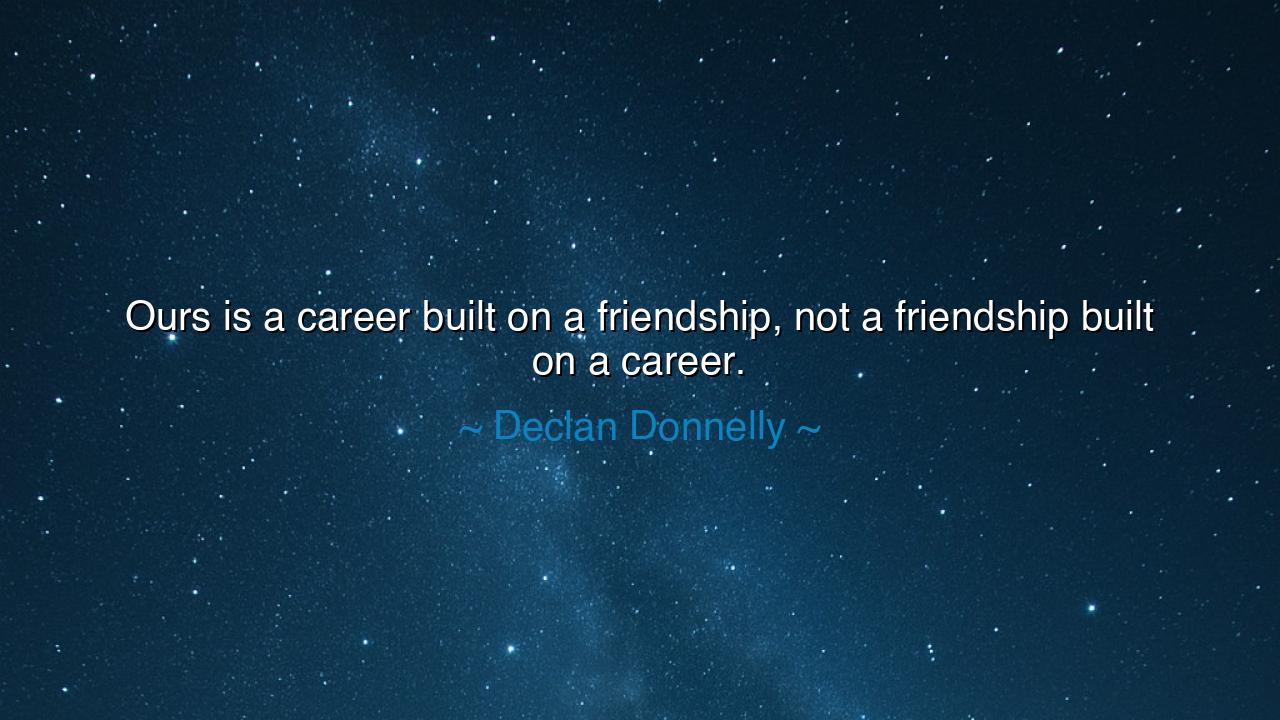
Ours is a career built on a friendship, not a friendship built on






In the intricate dance of human relationships, there is a profound truth that echoes through the ages: true friendship is not born out of self-interest or the pursuit of personal gain, but from a deep, shared bond that transcends the superficial. Declan Donnelly’s words, "Ours is a career built on a friendship, not a friendship built on a career," remind us that the most enduring and meaningful connections in life are not those formed by convenience or circumstance, but by genuine affection, trust, and mutual respect. This distinction between a career founded on friendship and a friendship built for career success carries with it a lesson of great importance, especially in a world often defined by competition and ambition.
In the ancient world, philosophers and poets alike celebrated friendship as one of the highest of human virtues. The Greeks revered philia, a love that was not self-serving, but selfless—a bond rooted in the pursuit of goodness and virtue. Aristotle, in his Nicomachean Ethics, famously distinguished between friendships of utility, those that are formed for mutual benefit, and friendships of virtue, those that are formed on the foundation of shared values and moral excellence. The friendship between Donnelly and his partner, Ant McPartlin, reflects this ideal—a connection that was not crafted out of the demands of fame or the pressures of the entertainment industry, but one rooted in genuine camaraderie. Their career was the byproduct of a friendship that remained steadfast and true, regardless of the shifting sands of their professional lives.
The Romans too understood the power of friendship and its distinction from self-interest. Cicero, in his work De Amicitia ("On Friendship"), extolled the virtues of a friendship based not on personal gain, but on a shared commitment to virtue. He wrote, "Friendship is born at that moment when one person says to another: 'What! You too? I thought I was the only one.'" This mutual recognition, this moment of understanding and shared values, forms the basis for a true friendship. Just as Donnelly and McPartlin built their professional journey on a friendship that was grounded in respect and shared goals, so too did the Romans understand that the highest form of human relationship was one that transcended usefulness and was based in trust and honor.
The story of David and Jonathan in the Bible further illuminates this idea. Their friendship is one of the most famous in history, built on loyalty, respect, and a deep personal connection that was not rooted in political ambition or material gain. Despite the fact that David was anointed to be king, and Jonathan stood to lose his own position as heir to the throne, they remained loyal to one another. Their bond was not a friendship designed to advance their careers, but one forged in mutual respect and selflessness. This is the kind of friendship that Donnelly refers to—the kind that is built on a solid foundation of mutual support and understanding, rather than on the fragile and often self-serving ambitions of professional life.
The lesson in Donnelly’s words is clear: when friendships are built on genuine affection, rather than on the pursuit of personal gain, they endure beyond the pressures of career and success. True friendship is not a means to an end, but an end in itself—a treasure that enriches life regardless of the circumstances surrounding it. Donnelly and McPartlin are an example of how loyalty, trust, and authentic connection can transcend the demands of any profession. Their success is not just a reflection of their skills or the opportunities they seized, but of the strength of their relationship—a relationship that is not contingent on external factors, but is instead sustained by their mutual respect and genuine bond.
In our own lives, we must be mindful of the relationships we cultivate. Friendship should not be seen as a tool to advance our personal or professional ambitions, but as a source of joy, support, and growth. It is through true friendships—those grounded in shared values and mutual respect—that we find the strength to endure life’s challenges. The lesson from Donnelly’s words is that the most meaningful and enduring relationships are those that are not influenced by career goals, but are instead based on authentic connection and shared experiences.
So, let us take this wisdom into our own hearts. Seek to build friendships that are not driven by ambition, but by genuine connection and the desire to support one another. Let your relationships be founded not on what others can offer you, but on what you can offer them—loyalty, trust, and a shared commitment to each other’s well-being. In doing so, you will find that true friendship is the greatest gift of all, and that it is the foundation upon which a meaningful, successful life is built—not through professional advancement, but through the love and support of those who stand by you, regardless of the world’s ever-changing circumstances.






AAdministratorAdministrator
Welcome, honored guests. Please leave a comment, we will respond soon